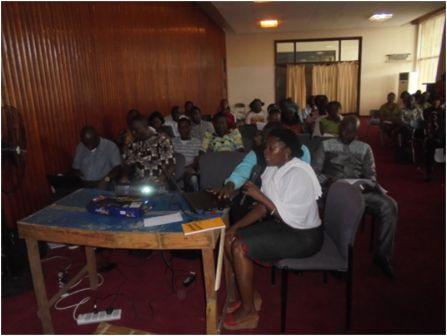Food and Nutrition stakeholders validate CRC position paper
Freetown, August 22 (SLENA) – The Right to Food (RTF) Committee made up of different agencies and organizations including the United Nations and civil society organizations (CSOs) on Friday 21st August 2015 organized a day’s validation workshop for the position paper to be presented to the Constitutional Review Committee on Tuesday this week. (Photo: Cross-section of stakeholders at the validation workshop )
The workshop took place at the Presidential Lounge of the National Stadium in Freetown with 70 participants drawn nationwide from various Ministries, Departments, Agencies and CSOs.
The paper position was prepared by Civil Society Organizations (CSOs) in Sierra Leone.
According to Frank Webber, Chairman of the Right to Food (RTF) Committee and of the Sierra Leone Alliance Against Hunger, Sierra Leone is ranked 183 out of 187 in the United Nations Human Development Index 2014 and is one of the countries with the highest infant and child mortality in the world (198/1000).
He continued that evidence has shown that one of the most effective ways to reduce infant and child mortality is to improve child nutrition, noting that along with other nutrition factors, stunting, wasting and micronutrient deficiencies account for about 35% of child deaths.
Frank Webber revealed that in Sierra Leone over 12% of children are underweight, 28.8% stunted and 4.7% are wasted, stressing that under-nutrition results from a combination of immediate causes of poor health nutrition such as the lack of available nutritious food or the presence of illness or disease and other underlying factors that influence those immediate causes, saying that such underlying factors can include family income, parental educational status and cultural factors that might impact on resource distribution within the household.
According to the RTF expert, in 2011, 45% of the population was found to be food in-secure during the lean season in a country where nearly 60% of the national Gross Domestic Product depends on agriculture, reiterating that this situation has been made even more fragile with the onslaught of the Ebola outbreak whereby 43% of the population were considered food insecure in March this year (7% severely food insecure).
He further stated that 70% of the rural population have their livelihoods built on agriculture, that 60% of women are farmers, that the percentage increased up to 80% in rural and hard to reach areas but observed, however, that Sierra Leone mainly relies on imported food hence posing a risk of being affected by global and regional food crisis, citing as example in 2008 and 2010 when global food crisis led to an increase in the price of rice by 50%.
Ramatu Jalloh of Focus 1000 disclosed that the Government of Sierra Leone has in the past 20 years committed to improving food and nutrition for the nation by signing up to global movements such as the Scaling Up Nutrition (SUN) Movement and the Zero Hunger Initiative, adding that the Government of Sierra Leone has also committed to regional conventions such as the Malabo Declaration on Accelerated Agricultural Growth and Transformation for Shared Prosperity and Improved Livelihood, the Declaration on Ending Preventable Child and Maternal Deaths in Africa and the Declaration on Nutrition Security for Inclusive Economic Growth and Sustainable Development in Africa.
She furthered that the right to adequate food is realized when every man, woman and child alone or in community with others has the physical and economic access at all times to adequate food or means for its procurement, adding that the right to food was formally recognized by the United Nations in 1948 in the Universal Declaration of Human Rights and since then has been established as a right within a number of international treaties.
Ramatu Jalloh also disclosed that the Government of Sierra Leone has shown strong commitment to improving food nutrition security for all in the country, intimating that in 2004, the Secretariat for the Right to Food was established in the Office of the President leading to the strengthening of the institutional capacities for the Ministry of Agriculture in addition to the setting up of the Food and Nutrition Directorate in the Ministry of Health and Sanitation, stating that in 2010, Sierra Leone also signed up to the Renewed Efforts Against Child Hunger and Under-Nutrition (REACH) followed by joining the SUN Movement for which a Secretariat was established in the Office of the Vice President.
“This commitment has led Sierra Leone to approach food and nutrition security in a holistic manner, recognizing the role of other sectors such as Water Sanitation and Hygiene (WASH), education, social protection and gender, among others, play in tackling food and nutrition security.
Dr. Mohamed Foh of the SUN Secretariat chaired the workshop.
Credit SLENA
Stay with Sierra Express Media, for your trusted place in news!
© 2015, https:. All rights reserved.






